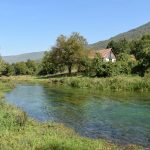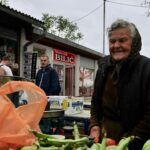April the 18th, 2025 – The Croatian accommodation structure is being called “the worst in the Mediterranean”, and service prices in tourism are at 90% of the EU average.
As tocka n i writes, Croatia recovered the fastest of all the Mediterranean tourist destinations following the coronavirus pandemic. That being said, the last two years have brought a significant slowdown in the pace of this important activity. The growth of foreign tourist overnight stays throughout 2024 slowed down to only 0.8% after only 2.4% having being recorded back in 2023. During that time, Croatia’s seven Mediterranean competitive destinations grew by an average of 12.6% in 2023 and 5.0% in 2024, with Italy, Spain and Portugal making the biggest contribution. This information has been taken from an analysis published in the publication Focus of the Week by the Chief Economist of the Croatian Association of Employers (HUP).
Neighbouring Italy achieved growth in foreign overnight stays of as much as 16.5% in 2023 and 6.8% in 2024. Compared to the pre-pandemic year of 2019, foreign tourist overnight stays across Croatia grew by barely 1%, while Portugal, Italy, Spain and Greece recorded growth of 15%, 13%, 7% and 6% respectively.
The growth of foreign overnight stays in hotels in Croatia in 2024 grew by 2.7% in 2024 after 7.6% in 2023, and short-term tourist accommodation recorded a decline in overnight stays despite a jump in the number of new beds to 679,000. The number of overnight stays in non-commercial accommodation also fell by 3.2%, which is in line with the leading short-term rental in family accommodation (34.4%) in terms of capacity. Although hotel beds make up only 9.3% of Croatia’s total accommodation and the relative base is extremely small, the growth of all overnight stays in hotels is similar to the Mediterranean average thanks to domestic guests compensating for the slower growth of foreign overnight stays than the Mediterranean average.
low tourist spending

In the couple of years, Croatia has significantly moved closer to the EU average in terms of price levels (to 90.4% from 78.7% in 2021). The challenge remains to adequately improve quality in a way the market expects, which is necessary if we don’t want to lose competitiveness. Restaurant prices are growing faster than hotel prices. This is especially the case when compared to the Mediterranean average, i.e. 10.1% in 2024 and 51.6% since 2019 compared to the Mediterranean average, where growth of 4.7% was recorded last year and 21.5% since 2019.
Hotel prices in Croatia have grown significantly faster than the Mediterranean average since 2019 (43.0% compared to 24.0%). Despite that, their growth in 2024 was significantly lower than across the Mediterranean (1.8% compared to 4.6%). Despite the strong nominal growth of foreign income of 42.2% compared to 2019, they fell by 8.6% in real terms. The deterioration began back in 2023 and continued throughout last year, given that the poor Croatian accommodation structure simply cannot create higher added value. Across the rest of the Mediterranean, the share of hotel beds in the accommodation structure has increased further at a high level (on average 43.3%), while in this, country it has decreased at an extremely low level. In fact, the Croatian accommodation structure is being referred to as the worst in the entire Mediterranean as a result.
The consequence is also the relatively low consumption of tourists in Croatia of around 170 euros per day compared to consumption in Italy and Spain. In those countries, tourists spend around 250 euros per day on average. In Portugal, guests spend more than 400 euros per day.
81% of those in the hotel and camping business expect reservation and revenue growth

The findings about the better booking situation of Croatian hotel and campsite owners are encouraging. In a survey carried out by the Croatian Tourism Association (HUT), approximately 81% of them expect booking growth above 6%, and about 57% of them expect revenue growth above 6%.
That means that even in a potential scenario of a decline in real disposable income and a recession for the Eurozone, Croatia doesn’t necessarily expect a significant decline in foreign demand for travel. It seems that tourists haven’t treated the expenses for this type of consumption as a “luxury” for a long time.
The existing (and poor) Croatian accommodation structure is currently dominated by short-term rentals with the lowest share of hotel accommodation in total accommodation in the EU and the Mediterranean. This generally generates little added value and attracts guests with lower purchasing power, Croatian tourism is therefore facing very significant limitations to further growth. Especially if last year’s decline in the number of foreign overnight stays continues in short-term non-commercial rentals in an even more uncertain year.
Tourism is the only activity in Croatia where gross value added per employee reached the German average in 2022. Inn the last two years, however, the country has recorded a decline in productivity, in contrast to growth elsewhere across the Mediterranean.
An insight into the results of the leading 10 listed hoteliers over the last three years shows a stagnation of the EBITDA margin at around 30% and a decline in the net margin to 10% with a continuous growth in the share of labor costs in revenue. The EBITDA margin is also four percentage points below 2019’s level, and the share of labour costs (27.4%) is three and a half percentage points above 2021’s level.
This is a consequence of the sharp increase in the minimum wage by 92% since 2019, in addition to the permanent increase in energy prices above the EU average. This year’s increase in the minimum wage by 15.4% is also putting pressure on profitability as well as the financial potential for investments in the hotel sector. To illustrate, almost 70% of hoteliers expect labour costs to increase by between 5-10%, or even above 10%. Therefore, it’s far from surprising that cash expenditures for investments have continued to fall to a mere 26.1% of operating income, that’s around 13% below 2019’s level.
can several billion euros of investments be realised in the next five years?

HUT’s survey shows that 44% of hoteliers consider tourism investments to be insufficient. Among the obstacles, they highlight urban development plans, the lengthy and burdensome process of obtaining building permits, the problem of tourist land and maritime domain, as well as the profitability of projects.
The Croatian accommodation structure (the uncontrolled expansion of short-term/non-commercial accommodation and the loss of competitiveness) is poor. This isn’t helped by falling productivity and growing imported and domicile uncertainty in the business environment. Owing to all of the aforementioned, it will be necessary to improve the conditions for investment in hotel capacities spanning four different areas. That will need to be done with the aim of realising five billion euros of investments over five years:
Make Croatia’s Law on Spatial Planning, the Law on Expropriation and Determination of Compensation and the Law on Strategic Investment Projects operational. This will be especially necessary when investments in transport and utility infrastructure are within the jurisdiction of several local government units at once, and if one of them refuses to cooperate.
Local (regional) tourist boards should be directly involved in the development of spatial plans. It is also necessary to introduce the obligation of any project owner to calculate the reception capacity and to adopt a Destination Management Plan in the Tourism Act. That should be done with the aim of prohibiting or restricting the use of areas intended for residential purposes as accommodation units for the temporary stays of guests.
One of the main innovations of the Maritime Domain Act is the institute of something called concession on request. It’s necessary to properly define open issues through secondary legislation, such as the problem of land in the camping segment in the share capital of a company subsequently declared a maritime domain. The same can be said for the performance of commercial activities in the maritime domain.
It will be necessary to enable users to easily obtain a concession, directly upon request, for technologically or functionally inseparable units of sea beaches, tourist moorings and tourist ports with hotels, campsites and tourist resorts. Furthermore, it will be necessary to precisely and fairly regulate the status of properties which (following the completion of transformation and privatisation) entered the maritime domain regime. The high-quality regulation of what maritime domain is, is a prerequisite for investment development and raising the quality of Croatian tourism.
Resolving the maritime domain issue is most often an obstacle to resolving the issue of “tourist land” and signing a lease agreement, which would finally define the legal interest of tourism companies in the matter of “tourist land”, i.e. open the way for a necessary new investment cycle.
Local government units must make strategic decisions on tourism growth in the future. This will primarily regard the accommodation structure based on encouraging the quality of accommodation facilities in accordance with development plans and sustainable development of the environment.












